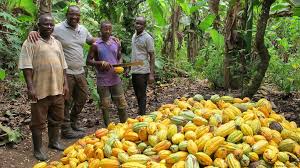LONDON, June 10, 2024 – A report by the Retailer Cocoa Collaboration [RCC] has found that the traceability of cocoa supplies has significantly improved in the last year as companies brace for the incoming EU Deforestation Regulation [EUDR]. However, the findings also highlight a lack of progress in addressing poverty and child labor within the sector.
The cocoa industry is tainted by the exploitation of children, farmers, and the environment. Key players have often declared their commitment to eliminating labor and climate woes. In light of such industry action, the report presents some crucial statistics.
RCC, a coalition of 11 UK and European retailers, including Aldi, Lidl, and Tesco, collected the data for the assessment through 2023 from significant cocoa traders like Barry Callebaut, Ecom, Olam, and Touton. It then evaluated their performance against various social and environmental metrics: traceability levels, deforestation and climate change, poverty and child labour.
An overview
The key findings suggest that while overall, trader performance has improved in 2023 compared to previous years, indirect supply chains remain hotspots for environmental risk and human rights violations.
“This is welcome news,” says Holly Cooper, senior consultant and the report’s lead author. “However, it’s a different story when it comes to cocoa from indirect sources.”
The report shows that 12 of the 17 “critical issues” identified by expert NGOs, such as the ability to demonstrate deforestation and conversion-free status for more than 75 percent of volumes or systematic tools to monitor labor conditions, have not been addressed by any trader in the indirect supply chain.
On the other hand, businesses have reported a rise in near-full traceability of their direct supply chain and certifications.
Improved traceability in direct supply
The report also states that traceability has improved by an average of 19% in direct supply chains in the last year.
Interestingly, in 2022, no trader reported near full traceability of the direct supply chain. However, in 2023, three traders achieved this.
“This increase in traceability is a step in the right direction,” explains Cooper, “but traders source as much as 97 percent of their cocoa indirectly, so overall, the sector is not yet ready for the EUDR.”
“More fundamentally, this lack of traceability means the sector has significant blind spots in its ability to understand and address sustainability risks in the cocoa supply chain.”
Land conversion unaddressed
Deforestation has been a persistent issue in the cocoa trade. Countries like Côte d’Ivoire and Ghana, the world’s largest cocoa producers, are estimated to have lost more than 90% and 65 percent of their forest cover since 1950, respectively.
Despite having anti-deforestation policies or commitments in place, efforts in the cocoa industry are often limited by either scope or geography. For example, some companies’ actions toward eliminating deforestation are limited to Ghana and Côte d’Ivoire based on their Cocoa & Forests Initiative membership.
The assessment finds that only four out of nine participating traders could prove that parts of their cocoa supply are deforestation and conversion-free, despite most having set commitments to zero deforestation.
Out of all the traders assessed, only one trader has an agroforestry policy, which encourages tree and crop plantation on the same piece of land. However, four traders have restricted these to a few countries or specific sourcing regions.
Among the most haunting horrors of the cocoa trade are child labour and poverty among farming communities. Usually, traders turn to Child Labour Monitoring and Remediation Systems [CLMRS] to tackle child labor.
RCC notes that two traders with significant operations in West Africa reported no data on CLMRS coverage, while five did.
Companies like Barry Callebaut provide certain support services to smallholder farmers in regions notorious for child labor in the recent past. These include subsidized soil inputs and financial support for third-party labor services.
With deep social and economic links to child labor, it is no surprise that poverty is prevalent among cocoa farmers. Farmers who live below the poverty line can turn to unpaid or child labor to increase productivity on the farm.
While some help is permissible, the report states that most of the work done by children in cocoa heavyweights like Ghana and Côte d’Ivoire lies outside the allowance. So much so that three traders report that a measly 10 percent or fewer direct supply farmers receive a living income.
Looking ahead
With rising cocoa prices, there is much to be lost and gained from the shifts in the cocoa market. “With global supply tight and prices exceptionally high, there is a real risk that progress on addressing environmental and social issues could be stalled or even reversed in the scramble for high-quality supply. The lack of policies and commitments covering indirect supply make these particularly high-risk,” says Cooper.
The report makes crucial recommendations for cocoa traders, such as accounting for indirect supply chains in sustainability commitments and actions.
RCC also urges traders to increase the coverage of deforestation commitments to account for all sources and causes of environmental damage while incorporating restrictions on land conversion.
Lastly, it is crucial to address and report progress on child labor in the supply chain while ensuring that farmers receive a fair living income.
https://thecooperator.news/coffee-importers-speed-up-shipments-before-eu-deforestation-law-says-ico/
Buy your copy of thecooperator magazine from one of our country-wide vending points or an e-copy on emag.thecooperator.news
